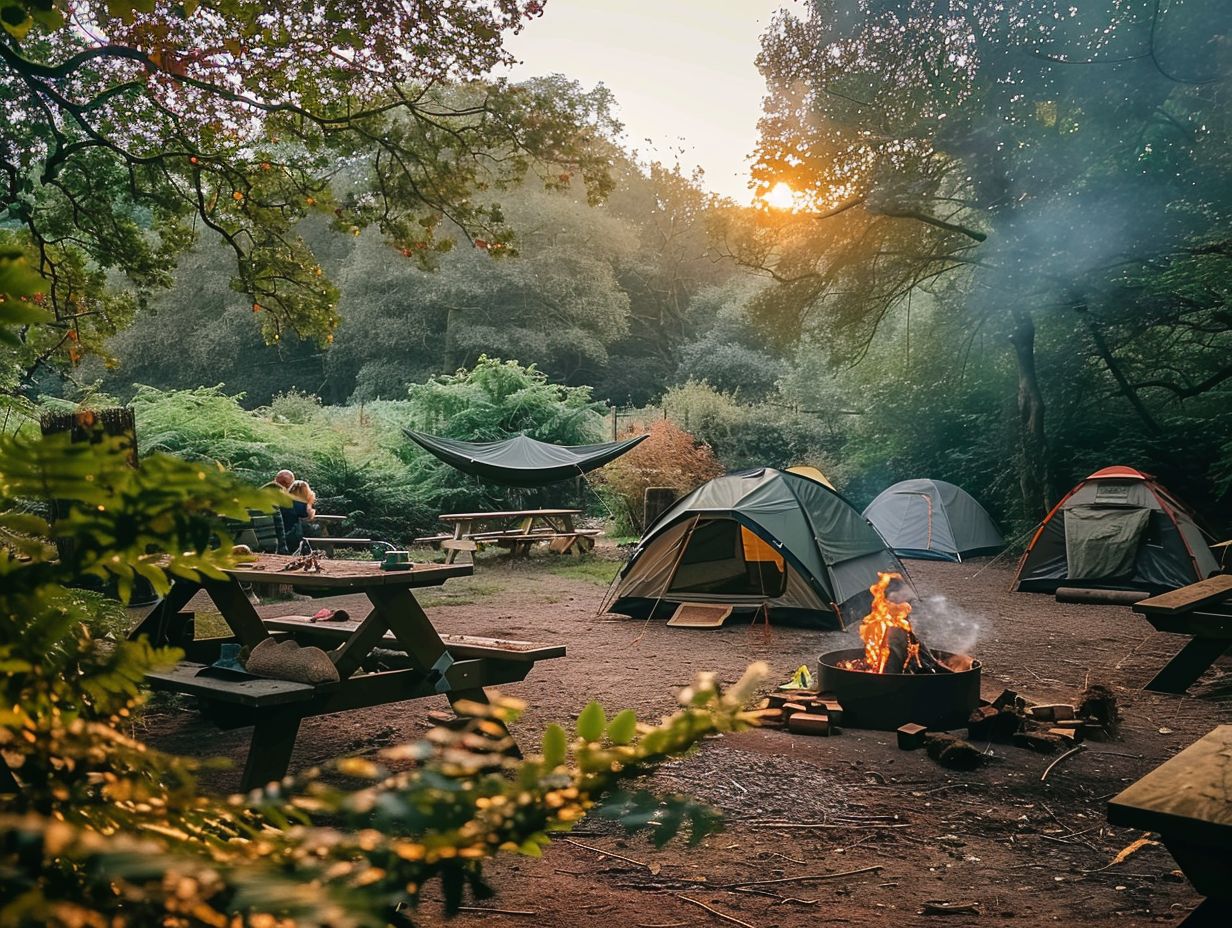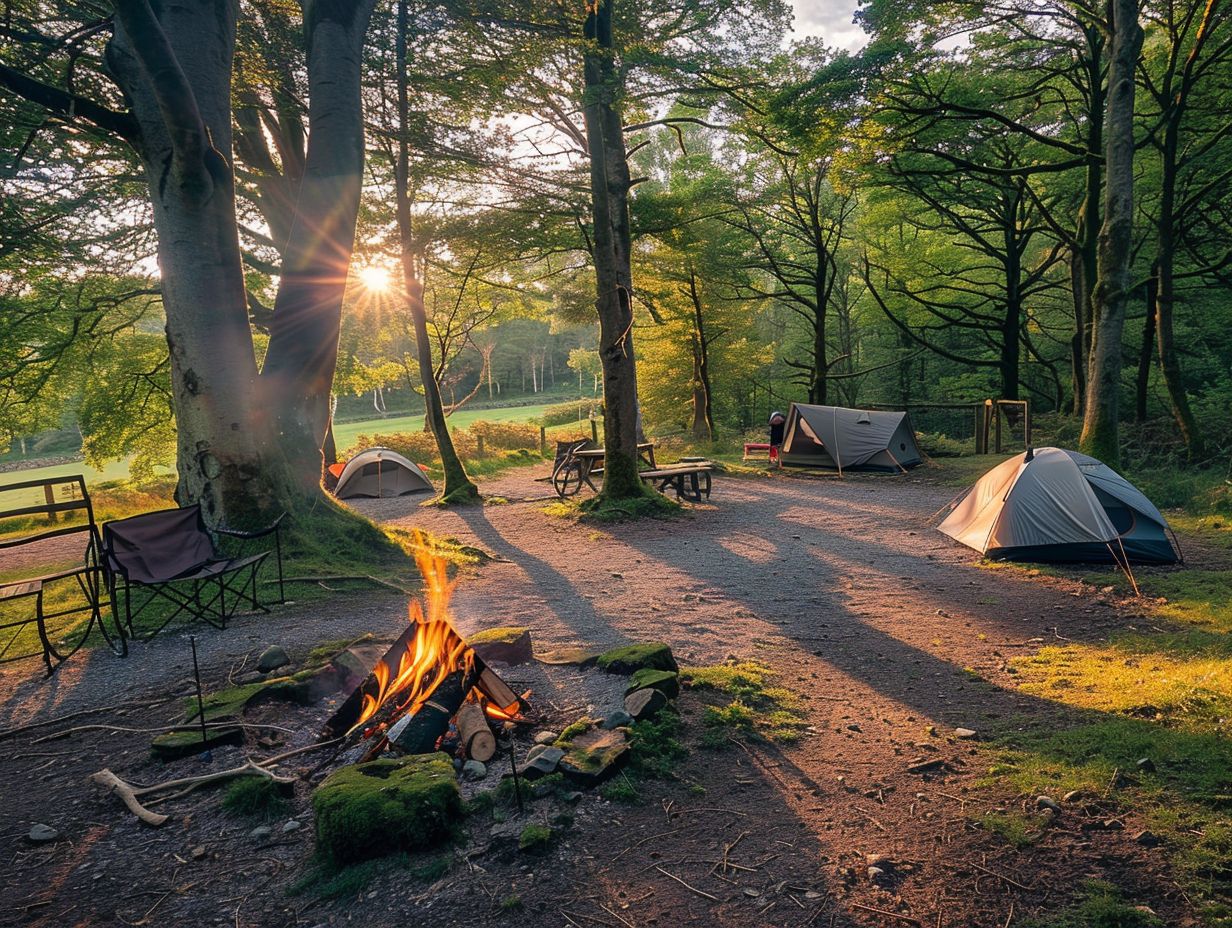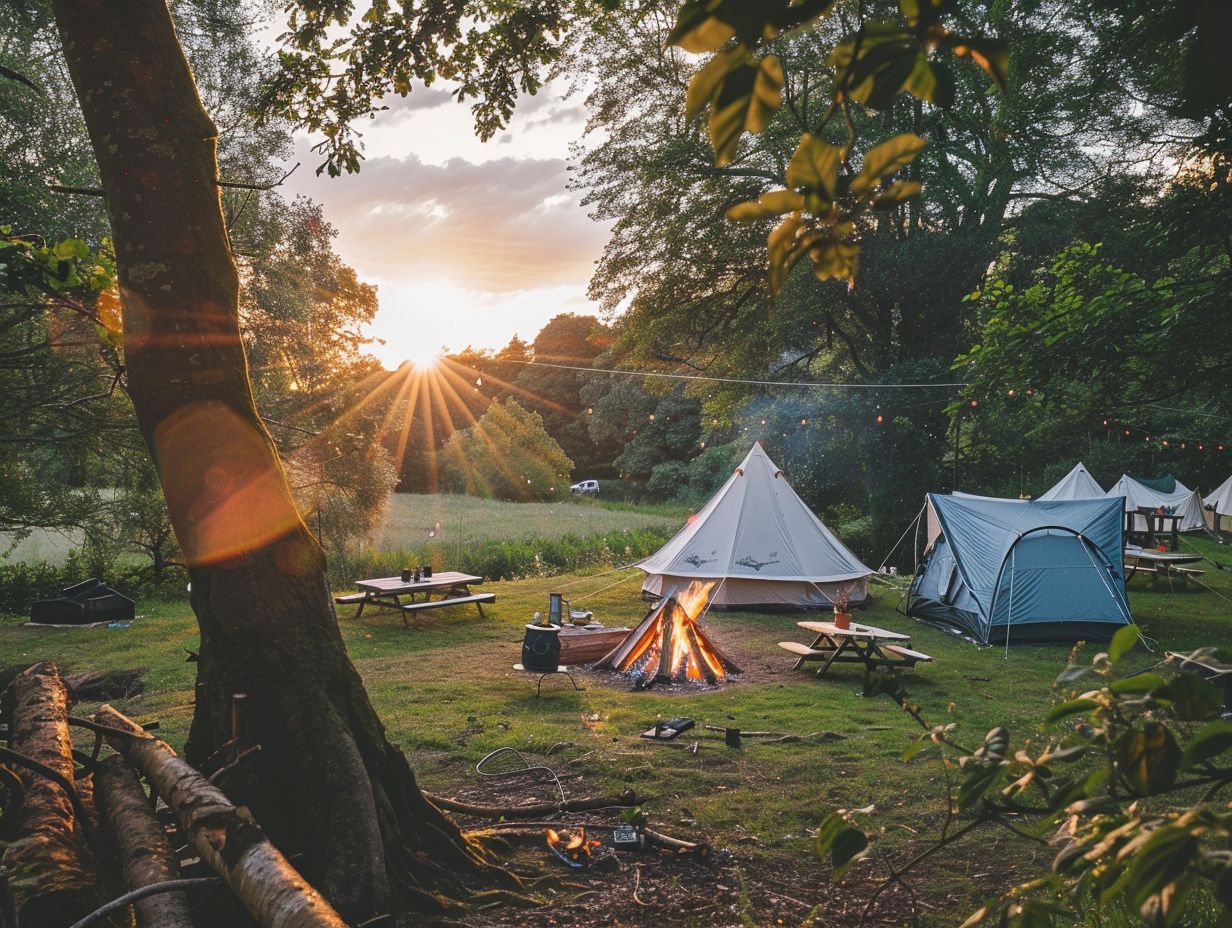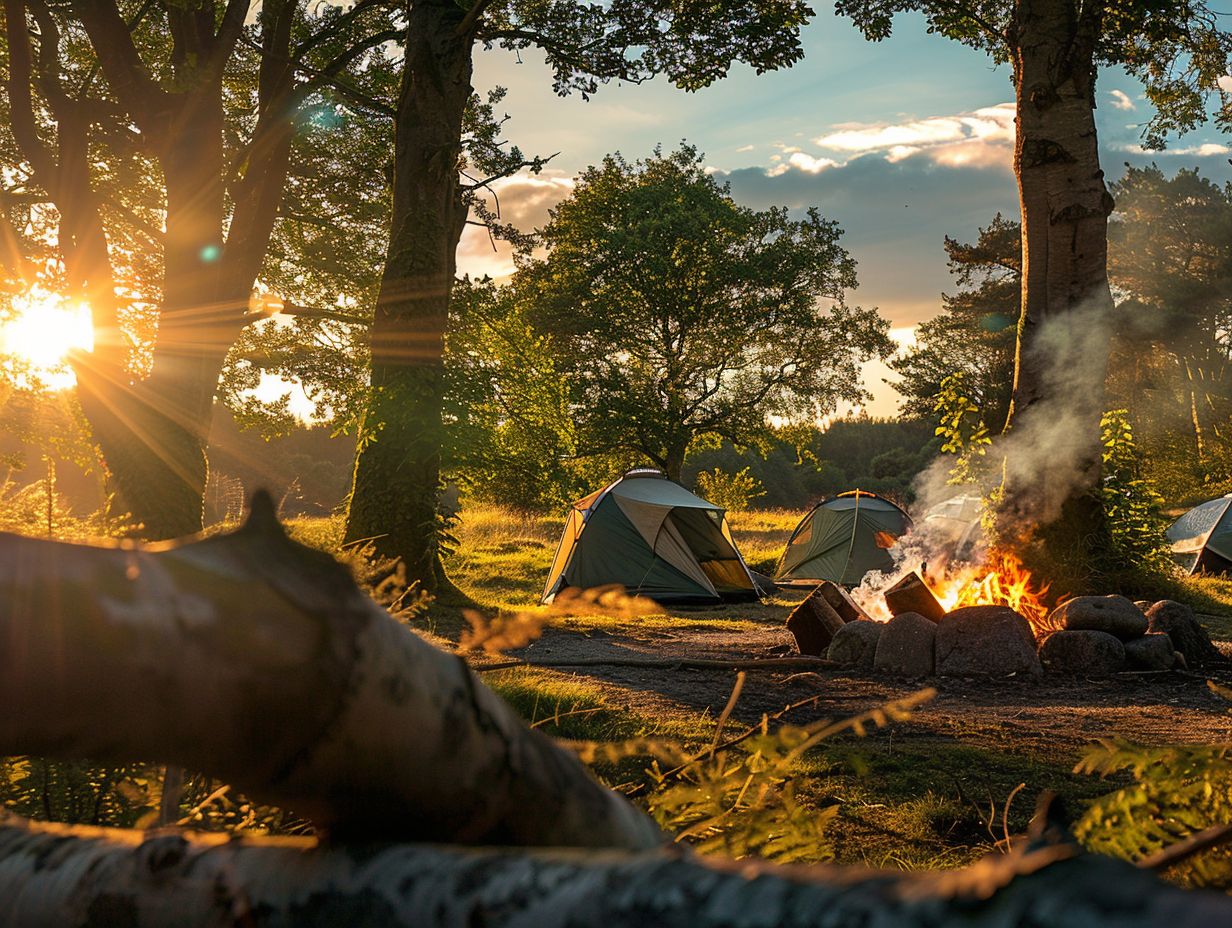When planning a camping trip in National Trust properties, it is crucial to maximise your outdoor adventure with these essential tips. These include booking campsites in advance and showing respect for wildlife and property. This comprehensive guide encompasses all the necessary information for ensuring a successful and pleasurable camping experience.
Whether you are an experienced camper or venturing into the great outdoors for the first time, these tips are designed to assist you in remaining safe, well-prepared, and environmentally conscious while immersing yourself in the natural beauty of National Trust properties.
Key Takeaways:

- Check campsite availability before heading to National Trust properties to avoid disappointment.
- Book your campsite in advance to secure a spot and ensure a smooth camping experience.
- Be familiar with the rules and regulations of the property to ensure a safe and enjoyable stay.
1. Check the Availability of Campsites
Before embarking on your camping trip in the picturesque Lake District, it is essential to check the availability of campsites to ensure a smooth and hassle-free experience. Popular camping spots in the Lake District include the idyllic Ullswater, scenic Windermere, and the charming Borrowdale Valley.
Researching campsites ahead of time allows you to secure a spot at these highly sought-after locations, especially during peak seasons when demand is high. Planning in advance not only guarantees you a camping site but also assists in selecting the optimal location based on your preferences, whether you favour lakeside views, forested areas, or easy access to hiking trails.
2. Book in Advance
To secure your place and avoid last-minute disappointments, it is recommended that you book your camping pitch in advance, especially if it is situated on National Trust land. Booking early not only provides the assurance of a confirmed booking but also enhances the likelihood of securing your preferred campsite location.
This early booking enables you to plan your trip more effectively and ensure that all necessary permits and regulations, particularly those concerning protected lands like those managed by the National Trust, are duly arranged.
Such a proactive approach can help in avoiding any last-minute rushes or changes, ultimately offering a more smooth camping experience.
3. Be Aware of the Rules and Regulations
Before you pitch your tent, it is essential to familiarise yourself with the rules and regulations governing camping in the Lake District, especially on National Trust properties, to ensure a responsible and enjoyable experience.
Among the key regulations to bear in mind are camping restrictions that designate specific areas where camping is permitted, ensuring the conservation of sensitive habitats.
Following fire guidelines is crucial to prevent wildfires, especially during dry seasons, by only using designated fire pits and never leaving fires unattended.
Equally important are waste disposal rules, which require campers to properly dispose of all rubbish and wastewater to protect the environment and prevent littering.
Respecting these regulations not only safeguards the natural beauty of the area but also ensures that future generations can enjoy it as well.
4. Plan Your Activities and Itinerary
When planning your camping adventure, consider creating a well-thought-out itinerary that includes outdoor activities like hiking in the breathtaking landscapes of the Lake District. This will allow you to maximise your time in nature and elevate your overall experience.
Exploring the various hiking trails in the region can unveil hidden treasures such as the Aira Force waterfall or the picturesque Catbells Summit, which boasts stunning panoramic views of the surrounding lakes.
Don’t forget to allocate time for stargazing in the evenings at designated locations like Latrigg or Wastwater, where the clear skies offer an ideal setting for observing celestial wonders.
For wildlife enthusiasts, engaging in birdwatching at spots like Derwentwater or Bassenthwaite Lake provides an opportunity to observe diverse bird species in their natural habitats.
5. Pack Light and Bring Essential Gear

When preparing for your camping trip, make sure to pack efficiently while keeping things light. Essential kit like a durable tent from Vango is crucial for ensuring comfort and convenience in the great outdoors.
Plus a reliable tent, it’s essential to have a high-quality sleeping bag that can keep you warm and well-rested during cold nights. Choose a sleeping bag designed for the temperature range of your camping destination.
For meal preparation, ensure you have cooking essentials such as a portable stove, utensils, and cookware. Additionally, remember to pack personal items like a head torch, insect repellent, and a multi-tool for added comfort and safety.
Investing in top-notch gear is key to guaranteeing a smoother and more enjoyable camping experience overall.
Be Mindful of Your Surroundings
Practising environmental awareness and adhering to the ‘Leave No Trace‘ principle whilst camping in the Lake District is imperative to safeguard the natural splendour of this UNESCO World Heritage Site and minimise the impact on the environment.
It is essential to be vigilant about waste management. Ensure all rubbish, including food scraps, is packed out, and refrain from leaving any items behind.Campers should strictly stick to designated paths to safeguard vegetation and prevent soil erosion. Respecting wildlife is equally important; maintain a respectful distance and refrain from feeding them.
Additionally, setting up camp at least 200 feet away from water sources is crucial for preserving water quality. By following these guidelines and practices, campers can contribute to conservation efforts in the Lake District and take part in a more sustainable outdoor experience.
Respect the Property and Wildlife
When camping in the Lake District, it is important to show respect for the property and wildlife, especially when on National Trust lands. To maintain a safe and harmonious environment, it is advised to keep a safe distance from animals and preserve the natural habitat throughout your camping experience.
The Lake District is known for its diverse wildlife, which includes the majestic red deer, elusive otters, and various bird species. These animals are integral to the delicate ecosystem of the region. It is crucial to observe them from a distance and refrain from feeding or disturbing them to ensure the protection of their natural behaviours and habitats.
Proper waste disposal is also essential as litter can have a detrimental impact on wildlife. As a responsible camper, it is important to be mindful of your environmental footprint and appreciate the natural beauty of the area while minimising any negative effects on the ecosystem.
Follow Proper Waste Disposal Practices
In adherence to responsible camping practices, ensure proper waste disposal by recycling and minimising your environmental impact while camping in the Lake District, adhering closely to the principles of sustainability and conservation.
One effective method to reduce the use of single-use plastics is by opting to use reusable containers for food and drinks instead of disposable ones. It is advisable to choose products with minimal packaging to lessen waste generation.
When disposing of rubbish, it is important to separate recyclables from general waste to facilitate the recycling process. Additionally, consider composting food scraps to lessen landfill waste and naturally enrich the soil.
Bringing biodegradable and eco-friendly toiletries is recommended to minimise the presence of harmful chemicals in water sources.
Lastly, it is imperative to bear in mind that leaving the campsite even cleaner than you found it plays a vital role in preserving the natural beauty of the environment for subsequent campers.
Be Prepared for Changes in Weather
In the unpredictable weather conditions of Scotland, it is imperative for you to prioritize safety by preparing for sudden weather changes while camping in picturesque locations such as Glencoe and Glen Etive.
Properly layering your clothing is crucial to ensure you stay warm and dry, particularly with the potential for rain and wind. Packing versatile pieces that can be easily added or removed will help you adapt to any changes in the weather.
Additionally, remember to include emergency supplies like a first aid kit, extra food and water, a torch, and a map. Before starting your camping trip, always check the weather forecasts to make informed decisions. Keep in mind that your enjoyment of Scotland’s stunning landscapes will be enhanced when you are well-prepared and prioritize safety.
Take Necessary Safety Precautions

Ensure safety during your camping trip by taking necessary precautions, including implementing fire safety measures to prevent accidents and guarantee a secure outdoor experience in various locations such as Glencoe and Glen Etive.
Remember to always establish your campfire in a clear, open area, keeping it away from overhanging branches or dry vegetation. It is essential to have a bucket of water or sand readily available for emergencies and never leave the campfire unattended.
Be sure to acquaint yourself with the local fire regulations and stay informed about weather conditions. In case of an emergency, ensure you have the nearest emergency contact numbers saved in your phone and share your camping itinerary with a trusted individual. Always adhere to Leave No Trace principles to preserve the environment and wildlife.
Consider Bringing a First Aid Kit
To handle unexpected situations effectively, you should consider bringing a well-equipped first aid kit on your camping trip. This will allow you to address minor injuries or emergencies promptly and ensure a safe and enjoyable outdoor experience.
Essential items to include in your camping first aid kit are:
- Various sizes of plasters for cuts and wounds
- Antiseptic wipes or cream to clean and disinfect injuries
- Common medications such as painkillers and antihistamines
- Emergency contact information with telephone numbers and addresses in case of need
- Sticky tape, scissors, and tweezers
Being prepared with these supplies can make a significant difference in quickly dealing with any health-related incidents that may occur during your adventure in the great outdoors.
Familiarise yourself with the property’s history
Enhance your camping experience by immersing yourself in the rich history of the National Trust properties in the Lake District. Connect with the heritage of renowned figures like Beatrix Potter and gain a deeper appreciation for the cultural significance of the surrounding areas.
The Lake District, recognised as a UNESCO World Heritage site, showcases a mosaic of historical landmarks that offer insights into the region’s past.
Beatrix Potter, acclaimed for her beloved children’s books, drew inspiration from the natural beauty of the area, and numerous sites in the region are associated with her life and literary works.
Visitors have the opportunity to stroll through her former residence at Hill Top or venture into the landscapes that influenced her iconic tales. Exploring the National Trust sites provides a profound understanding of the region’s heritage and the enduring influence of figures such as Potter on its cultural heritage.
Engage in Sustainable Practices
Promote sustainability and environmental stewardship by engaging in eco-friendly camping practices such as recycling, reducing waste, and conserving resources to preserve the natural beauty of the Lake District for future generations.
To minimise your ecological impact while enjoying the outdoors, consider choosing eco-friendly camping gear. Opt for products made from sustainable materials such as bamboo, recycled plastics, or organic cotton. Embrace energy-saving techniques like using solar-powered lanterns and portable chargers to reduce your carbon footprint.
When cooking, efficient methods like using a camp stove instead of a fire can help minimise wood consumption. By adopting these practices, one can enjoy the serenity of nature while being a responsible guardian of the environment.
Be Considerate of Other Campers
Maintain a sense of community and camaraderie by being considerate of other campers in shared spaces, practicing good campsite etiquette, and fostering a positive and inclusive camping environment for all.
This is essential for creating a harmonious camping experience where everyone can relax and enjoy nature without disturbances.
Respecting others’ peace and privacy by keeping noise levels to a minimum during quiet hours is key. Following campsite rules regarding waste disposal, fires, and wildlife interactions not only ensures safety but also demonstrates responsible camping behaviour.
By upholding these principles, you contribute to a welcoming atmosphere that encourages mutual respect and shared enjoyment of the great outdoors.
Leave No Trace Behind

As a responsible camper, you should prioritize the ‘Leave No Trace’ principle by clearing up after yourself, minimising your environmental footprint, and leaving the campsite in pristine condition to uphold the beauty of nature in the Lake District.
When preparing to depart, you must double-check the area for any items that could have been accidentally left behind.
Dispose of all rubbish properly in designated bins or take it with you to maintain the integrity of the environment. Avoid using soap or detergent directly in natural water sources and opt for biodegradable options if necessary.
Encourage fellow campers to follow these practices and create a culture of environmental responsibility for future generations to enjoy the outdoors sustainably.
Frequently Asked Questions
What are some basic tips for camping in National Trust Properties?
1. Always check the rules and regulations for camping at the specific property before you go.
2. Pack and prepare accordingly for the terrain and weather of the property.
3. Respect the surroundings and leave no trace of your visit.
4. Make sure to have the necessary permits and permissions for camping.
5. Plan your itinerary and activities in advance to make the most of your stay.
6. Keep in mind that facilities and amenities may be limited, so come prepared with necessary supplies.
Can I bring my own camping equipment to National Trust Properties?
Yes, you can bring your own camping equipment to National Trust Properties. However, it is important to check with the specific property beforehand to ensure that camping is allowed and if there are any restrictions on the type of equipment you can bring.
Are there any designated camping areas in National Trust Properties?
Yes, most National Trust Properties have designated camping areas that are suitable for tents, caravans, or campervans. These areas are usually equipped with basic facilities such as toilets and water sources.
Can I have campfires at National Trust Properties?
Campfires are not allowed at all National Trust Properties. Some properties may have designated areas for campfires, but it is important to check with the specific property beforehand. In areas where campfires are not allowed, you can use a camping stove for cooking.
What are some things to keep in mind when camping in National Trust Properties with children?
1. Choose a property with child-friendly activities and facilities.
2. Make sure to supervise children at all times and follow safety guidelines.
3. Pack appropriate clothing and gear for children according to the weather and terrain.
4. Plan activities and keep children entertained to avoid boredom.
5. Educate children on the importance of respecting nature and leave no trace principles.
Can I bring my pet with me when camping at National Trust Properties?
Pets are not allowed at all National Trust Properties, unless they are registered assistance dogs. It is important to check with the specific property beforehand to confirm their pet policy.



